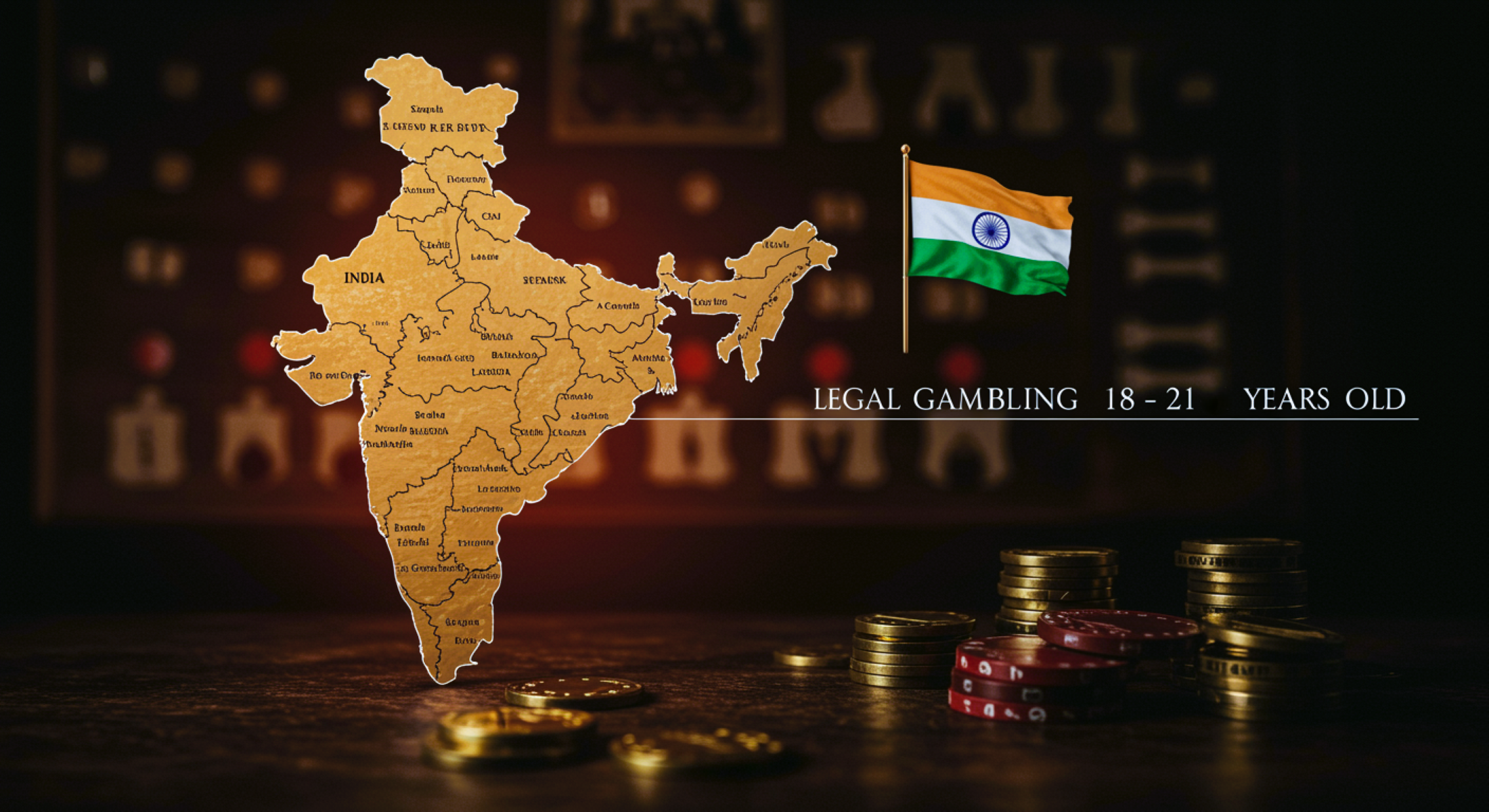Gambling in India is an exciting yet complex topic, not just because of the variety of games available but also due to the differing regulations that vary from state to state. One of the most important aspects of gambling is the legal age for participating in these activities. So, what is the legal age for gambling in India? Let’s dive into this topic and explore the details.
Legal Framework Governing Gambling in India
The legal framework surrounding gambling in India is primarily governed by the Public Gambling Act of 1867, an old but still relevant law that lays the foundation for gambling regulations across the country. This Act was created during the British colonial period and prohibits gambling in public places unless it is specifically allowed by the state. However, one of the key limitations of this law is that it does not define the legal age for gambling. Instead, each state in India has the authority to set its own age restrictions for gambling activities, which means that the legal age for gambling can differ significantly from one state to another. This decentralization of regulation has resulted in a patchwork of gambling laws across India, making it necessary for individuals to understand the specific laws in their state.
Although the Public Gambling Act provides the general framework, gambling laws have evolved significantly over time with the rise of various forms of gambling, such as online betting and casino gaming. The 1867 Act focuses primarily on regulating physical gambling venues, which were a major concern at the time of its enactment. Due to its age and lack of clarity on modern gambling activities, states began to pass their own laws to govern newer forms of gambling, such as online games and sports betting. Despite this, the Public Gambling Act continues to serve as the primary reference for most gambling-related legal matters in India, especially regarding what constitutes illegal gambling.
Public Gambling Act of 1867
The Public Gambling Act of 1867 is a historic piece of legislation that criminalizes the act of gambling in public places, with a few notable exceptions. It aims to control and regulate the establishment of gambling houses, including casinos and other venues where betting activities take place. While the Act is still in force, it doesn’t explicitly address the legal age for gambling, which remains a significant gap in Indian gambling legislation. As a result, the responsibility for determining the minimum legal age for gambling falls to the state governments, each of which can establish its own rules and regulations in line with local needs and concerns. This decentralized approach has led to variations in gambling laws across the country, creating confusion among both local players and tourists who wish to engage in gambling.
Due to its vague stance on the legal age for gambling, the Public Gambling Act has not been entirely effective in addressing modern gambling issues. In the age of online casinos and betting platforms, the Act’s provisions are often inadequate, leaving gaps in regulation that can potentially expose players to risks, including underage gambling. As a result, many Indian states have taken matters into their own hands by implementing more specific gambling regulations, such as setting a legal age for participation and enforcing age verification processes in both physical and online gambling venues. These state-level regulations are crucial in creating a safer gambling environment, particularly when it comes to protecting vulnerable individuals, especially minors.
Legal Gambling Activities in India
In India, gambling is not uniformly legal across the country, and the types of gambling activities permitted vary greatly from state to state. The country recognizes several forms of legal gambling, including casinos, online gambling, horse racing, and lotteries. Each of these activities has specific rules and regulations depending on the state in which they are offered. In some states, such as Goa and Sikkim, tourists and locals can visit casinos, whereas other states may only allow online gambling or horse racing. It’s crucial for anyone wishing to participate in gambling activities to familiarize themselves with their local laws to ensure they are complying with age restrictions and other regulations.
Casinos
Casinos are legal in specific states of India, including Goa, Sikkim, and Daman, where both locals and tourists can participate in various casino games. These casinos offer a wide range of games, such as poker, blackjack, roulette, and slot machines, creating an exciting environment for gambling enthusiasts. However, the legal age for gambling in these casinos varies depending on the state’s regulations. For example, in Goa and Daman, individuals must be at least 21 years old to gamble in a casino, while in Sikkim, the legal age is 18. This difference in age requirements can sometimes be confusing for people, especially tourists who are not familiar with the local laws.
- Goa: The legal age for gambling in casinos is 21 years old.
- Sikkim: The legal age for gambling is 18 years old.
- Daman: Similar to Goa, the legal age for casinos is 21 years old.
These casinos are heavily regulated, with strict laws in place to ensure that gambling activities are conducted fairly and responsibly. They are subject to frequent checks by state authorities to prevent illegal activities such as underage gambling or fraud. In states where casinos are legal, they often serve as significant tourist attractions, drawing people from around the world to experience the thrill of casino gaming.
Despite being legal in some states, casinos in India are not universally allowed. Some states, like Maharashtra and Delhi, prohibit the establishment of casinos entirely, limiting residents to other forms of gambling such as lotteries or online betting. This disparity across states is important for potential gamblers to be aware of, as those interested in visiting a casino must travel to one of the states where it is permitted. Additionally, the legal age for gambling in casinos is an essential aspect of the regulatory framework that ensures only mature individuals participate in such activities.
Online Gambling
Online gambling has become an increasingly popular form of entertainment, allowing players to access gambling games from the comfort of their homes. The growth of online casinos and betting platforms has brought about new opportunities for gambling in India. However, as with physical casinos, the legal age for online gambling is typically the same as the legal age for land-based gambling in a particular state. This means that if a state has a legal age of 21 for physical gambling, the same age restriction will likely apply to online gambling within that state.
Online gambling in India includes various activities such as poker, casino games, sports betting, and fantasy sports, which are offered through numerous websites and apps. The major advantage of online gambling is that players can easily access these platforms from anywhere, provided they are of legal age. However, since the regulation of online gambling is less clear than that for physical gambling, there are concerns about underage participation. Many online gambling websites attempt to implement age verification measures to prevent minors from registering on their platforms, but these measures are not always foolproof.
While there is no national law that directly governs online gambling, the activity is generally considered legal in states where physical gambling is allowed. States like Sikkim have taken steps to regulate online gambling by issuing licenses to operators, creating a more structured environment for those wishing to gamble online. In contrast, other states like Maharashtra have banned online gambling altogether, further adding to the complexity of the legal landscape. The increasing use of smartphones and high-speed internet access has also made online gambling more attractive, which has led to discussions about the need for more robust regulations to ensure fair play and protect underage individuals.
Horse Racing and Lottery
Apart from casinos and online gambling, horse racing and lotteries are two other popular forms of legal gambling in India. Both activities have been a part of Indian culture for decades and are legalized in several states. Horse racing, for example, is a well-established sport that involves placing bets on horses during races held at authorized tracks. States like Maharashtra, Delhi, and West Bengal host horse racing events, where bettors can legally wager on the outcomes. The legal age for betting on horse racing is typically 18 years old, making it one of the most accessible forms of gambling for adults in India.
- Maharashtra: Legal to bet on horse racing at age 18.
- Delhi: Legal to bet on horse racing at age 18.
- West Bengal: Legal to bet on horse racing at age 18.
In addition to horse racing, lotteries also provide a legal form of gambling in many states. The lottery system allows individuals to purchase tickets and hope to win large cash prizes. State-run lotteries are available in several states, and the age restriction for purchasing lottery tickets generally ranges from 18 to 21 years, depending on the region. Lotteries are a popular form of low-stakes gambling, attracting a wide range of people, especially those who enjoy the excitement of a potential win with minimal investment.
While horse racing and lotteries may appear less glamorous than the glitz and glamour of casinos, they still play an essential role in India’s gambling landscape. The government’s regulation of these activities helps ensure fairness and protect against illegal practices. As with other forms of gambling, it is important for individuals to understand their local state laws and ensure they meet the legal age requirements before participating.
What is the Legal Age for Gambling in Different States
As discussed previously, the legal age for gambling in India is not uniform across the country. It varies depending on the state’s laws and regulations. Some states have relatively lenient laws, allowing individuals as young as 18 to participate in gambling activities, while others have stricter regulations that require individuals to be older. This variation can lead to confusion, especially for tourists and residents who may not be familiar with the local rules in different regions. Below is a detailed breakdown of the legal age for gambling in several key states and territories in India.
Each state’s legal age for gambling is determined based on its own laws, which are influenced by a range of factors, including the socio-economic environment, public safety concerns, and cultural attitudes toward gambling. As such, it is crucial for those wishing to engage in gambling activities to be aware of the specific age limits in their state or destination.
Goa
Goa is one of India’s most famous destinations for gambling, thanks to its legal casinos that cater to both tourists and locals. The state has some of the most lenient gambling laws in India, making it a top choice for visitors seeking a gambling experience. The legal age for entering a casino in Goa is 21 years old. This age requirement ensures that individuals are mature enough to understand the risks involved in gambling and can make informed decisions. Goa’s casinos offer a wide range of games, including poker, blackjack, and slot machines, making it a major attraction for gambling enthusiasts.
- Legal Gambling Age: 21 years old
- Gambling Types: Casinos (land-based and riverboat)
- Key Attraction: Known for its vibrant tourism industry, Goa draws both domestic and international gamblers.
Although the legal age is set at 21, Goa’s liberal stance on gambling is seen as a positive factor for the tourism sector, as it allows tourists from around the world to experience legal gambling activities. The state has implemented this age limit to ensure that people are old enough to handle the financial and psychological aspects of gambling, especially in the high-stakes environment of a casino.
Sikkim
Sikkim stands out as another state that allows casinos, but it has one of the lowest legal gambling ages in India. In Sikkim, the legal age for gambling is 18 years old, which is considered quite liberal compared to other states like Goa and Daman. This makes Sikkim an attractive destination for younger individuals who wish to try their luck in legal gambling activities. Sikkim has also introduced online gambling, making it one of the pioneering states in the regulation of digital gambling platforms.
- Legal Gambling Age: 18 years old
- Gambling Types: Casinos, Online Gambling
- Key Attraction: A lower legal age for gambling compared to other states, and a growing presence in the online gambling sector.
The lower legal age in Sikkim has made it a popular destination for those under 21 who want to experience the thrill of casino games and online gambling. While the state’s laws are considered progressive in terms of gambling age, they have also spurred debate about the potential risks of early exposure to gambling activities, especially for young adults. Nevertheless, Sikkim continues to serve as a model for legal gambling in India, offering a mix of both physical and online gambling options.
Daman
Daman is another region that allows casinos, and it follows a similar legal framework to Goa. The legal age for gambling in Daman is 21 years old, which aligns with Goa’s regulations. This age restriction is in place to ensure that only adults are allowed to participate in gambling activities, promoting responsible gambling practices. Daman is a relatively small territory, but its casinos offer a range of games similar to those found in Goa, attracting visitors who want to experience gambling in a controlled and regulated environment.
- Legal Gambling Age: 21 years old
- Gambling Types: Casinos
- Key Attraction: Similar to Goa, but a quieter alternative for those seeking a more relaxed gambling experience.
Like Goa, Daman has become a popular destination for both Indian and international tourists who enjoy the combination of its natural beauty and legal gambling opportunities. The legal age of 21 ensures that visitors are of the age to make responsible choices when it comes to gambling, aligning with the state’s overall goal to provide a safe and enjoyable environment for both tourists and locals.
Other States with Legal Gambling
In addition to Goa, Sikkim, and Daman, several other states in India have legalized specific forms of gambling, such as lotteries, online gambling, and sports betting. However, the legal age for gambling can vary significantly between states. Below is an overview of some of the other key states with legal gambling activities:
| State | Legal Gambling Age | Legal Gambling Activities | Notes |
| Karnataka | 18 years old | Online gambling, Lottery | Known for allowing online betting and lottery sales |
| Maharashtra | 18 years old | Lottery, Horse racing | Online gambling is prohibited, but horse racing is legal |
| Delhi | 18 years old | Online gambling, Lottery | No casinos, but online gambling and lottery are permitted |
| West Bengal | 18 years old | Lottery, Horse racing | Horse racing is a popular betting activity in the state |
| Kerala | 21 years old | Lottery | Strict regulations on gambling, especially in casinos |
These states tend to have more flexible laws when it comes to forms of gambling other than physical casinos, such as online betting and lotteries. In many cases, the legal gambling age for activities like online gambling and lotteries is set at 18 years old, making them more accessible to younger adults. However, the absence of physical casinos in some of these states means that the gambling opportunities are limited to less interactive activities like lotteries and sports betting.




